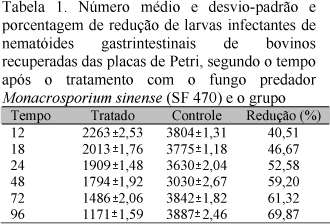This study aimed to evaluate the viability of the predatory fungi Monacrosporium sinense (SF 470 isolate) to prey infective trichostrongylids larvae of cattle after the test of passage through the gastrointestinal tract. One hundred grams of pellets with the isolate of M. sinense were orally administered to two six-month-old holstein×zebu crossbred calves. Two similar animals that orally received 100g of pellets without the fungal isolate were used as control. Fecal samples collected at 12, 18, 24, 48, 72 and 96 hours after the treatments were allocated in Petri dishes and in fecal cultures and incubated for 15 days at 25ºC. There was significant reduction (P<0.05) of the average number of infective larvae of Cooperia spp. and Haemonchus spp. in the animals treated with the fungus when compared to the control calves. At the end of the experiment, the differences were 69.9% in the Petri dishes and 61.3% in the fecal cultures. The fungi M. sinense was effective in the control of infective gastrointestinal trichostrongylids larvae of cattle in laboratory conditions.
biological control; nematophagous fungi; Monacrosporium sinense; Cooperia spp; Haemonchus spp




